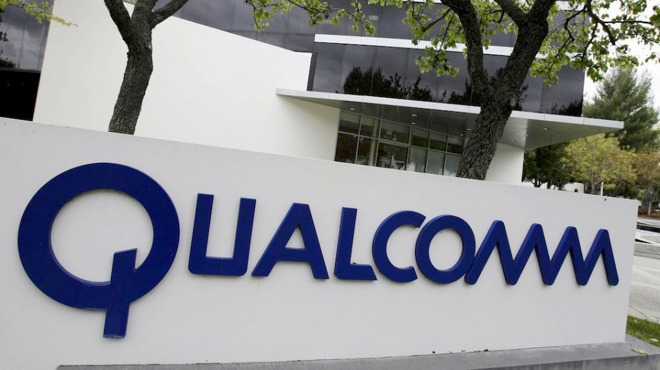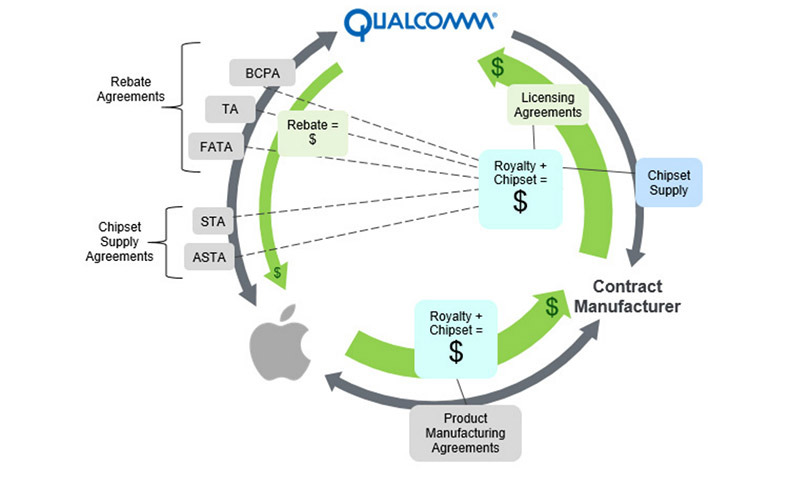An arbitration panel has awarded BlackBerry a preliminary $814.9 million to resolve its claim that it had overpaid patent royalties in its contract with Qualcomm. The specific issue pertains only to Qualcomm's contract with BlackBerry, but highlights the firm's series of parallel intellectual property disputes, most notably a trio of global cases involving Apple as well as government antitrust actions in China, Korea and the United States.
BlackBerry's dispute involved a contractual "unit royalty cap" involving devices it sold between 2010 and 2015. Qualcomm agreed to resolve the issue through arbitration, so even though it stated that it "does not agree with the decision," it recognized it as "binding and not appealable."
Qualcomm patents central to mobile technology
Qualcomm has patents on key aspects of mobile connectivity related to mobile networks and Baseband Processors. A Baseband Processor, also known as a mobile modem, is an independent ARM computer-on-a-chip that runs its own proprietary OS and handles mobile radio and analog audio processing. It talks to a device's main Application Processor, a separate ARM chip that runs an OS such as Android or iOS.
Qualcomm sells both its own Snapdragon Application Processor with an integrated mobile Baseband Processor (commonly used in higher-end Android devices), as well as the independent Baseband Processors it provides to Apple for use in conjunction with Apple's own A-series Application Processors in iOS devices.
Qualcomm also licenses its technology to most other mobile chipmakers, due to the fact that its IP is "standards essential" for building devices that work on existing CDMA and LTE mobile networks.
Apple's allegations of patent shenanigans
In January, Apple filed suits against Qualcomm in the U.S., China and the U.K. for what it called a nonpayment of royalty rebates, which it said Qualcomm had held up in retaliation for Apple's cooperation with the Korean Fair Trade Commission. That agency had previously investigated Qualcomm's business practices in South Korea and determined last December that it should be fined $854 million.
Apple alleged that Qualcomm subsequently withheld nearly $1 billion in rebates it was owed, and then "attempted to extort Apple into changing its responses and providing false information to the KFTC [related to its investigation] in exchange for Qualcomm's release of those payments to Apple. Apple refused."
Apple's lawsuit further revealed that Qualcomm had demanded IP royalties on mobile chips Apple had been buying from Infineon between 2007 and 2011, when Apple began using Qualcomm's chips. Samsung had similarly sought to double dip, demanding royalties from Apple over technology Samsung had already licensed to Infineon.
Apple also charged that Qualcomm forced Apple's smaller contract manufacturers to pay "exorbitant," secret royalties due to the lack of market leverage those suppliers had. That expense was then passed on to Apple in the form of higher costs.
Apple sought to negotiate a direct licensing agreement with Qualcomm as existing contracts began to expire at the end of last year, but Qualcomm wanted to maintain its lucrative status quo.
Apple's lawsuit seeks the return of unpaid reimbursements, as well as repayment of excessive royalties already paid that are much higher than the expected FRAND (fair, reasonable and non-discriminatory) royalties covering standards-essential technology patents.
One of the claims made by Apple is that Qualcomm— in demanding a fixed percentage of its finished products— is "charging royalties for technologies that they have nothing to do with them" effectively profiting off Apple's own, independent work to add value to its products.
Apple has stated that Qualcomm charges it five times as much as all other patent licensors combined, and that it has been fruitlessly working to resolve its disputes with Qualcomm for years.
Countersuit by Qualcomm
Earlier this week, Qualcomm responded with a countersuit of its own, claiming that "Apple has attempted to force Qualcomm to accept less than fair value for the use of its intellectual property by wielding its immense power over Qualcomm and by engaging in a host of unlawful acts."
Qualcomm charged that Apple has "interfered" in its secret relationships with contract manufacturers, and wrongly induced regulatory action against it in a number of jurisdictions.
Apple has already returned to use some rival Baseband Processors from Intel (which acquired Infineon), resulting in a mix of modems used in iPhone 7 models. Qualcomm has further claimed that Apple's throttling of the performance of Qualcomm chips to match the performance of Intel's offerings has caused it additional damages.Qualcomm's chief executive Steven Mollenkopf said he expects to resolve its issues with Apple out of court.
Billions on the line
In addition to losing nearly a billion to BlackBerry and to Korean regulators, Qualcomm's leverage in demanding IP royalties has also been called into question by Chinese chip manufacturers. In 2015 the company was charged a $975 million fine by Chinese antitrust authorities to resolve a dispute. Last year Qualcomm resolved another ongoing dispute it had with Chinese phone maker Meizu.
In January, the U.S. FTC also launched its own lawsuit against Qualcomm related to violations of anti-competition laws.
Beyond the potential consequences of action from the FTC and fallout from Apple's series of global lawsuits against it, Qualcomm also faces the potential of a loss in business from Apple, the world's largest maker of premium, high-end phones.
In February, Intel unveiled a new Baseband Processor with support for CDMA as well as modern LTE Category 16/13 support across 35 bands.
That chip is fast enough to match the top speeds of virtually all existing mobile networks that have been deployed. A reduction of dependence upon Qualcomm could significantly reduce Apple's costs, while also giving it leverage in its negotiations with Qualcomm.
In addition to affecting Qualcomm directly, the loss of Apple's business would also make it more difficult for the chipmaker to aggressively advance its technology, as it would be left dependent upon Android devices that make up a shrinking segment of the most valuable premium tier of the market.
 Daniel Eran Dilger
Daniel Eran Dilger









-m.jpg)






 Charles Martin
Charles Martin
 Christine McKee
Christine McKee
 Wesley Hilliard
Wesley Hilliard
 Malcolm Owen
Malcolm Owen
 Andrew Orr
Andrew Orr
 William Gallagher
William Gallagher
 Sponsored Content
Sponsored Content








19 Comments
Next, 2B$ to Apple
Damn! Good for BB. I hope they do something useful with that money, if and when they get paid.
I would hate to think that the iPhone would get stuck with another cheap substandard modem just so Apple could screw Qualcomm some more.
Lawsuits, the last refuge of companies who make buggy whips.